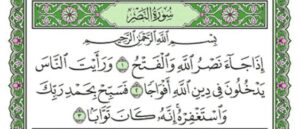Surah Nasr in Arabic
بِسْمِ ٱللَّهِ ٱلرَّحْمَٰنِ ٱلرَّحِيم
إِذَا جَاءَ نَصْرُاللهِ وَالْفَتْحُ
وَرَأَيْتَ النَّاسَ يَدْخُلُونَ فِی دِينِ اللهِ أَفْوَاجًا
فَسَبِّحْ بِحَمْدِ رَبِّكَ وَاسْتَغْفِرْهۚ إِنَّهُۥ كَانَ تَوَّابًا
Surah Nasr in English
In the name of Allah, the most compassionate, most merciful
When Allah’s help comes with victory,
and you see the people entering Allah’s religion in throngs,
then celebrate the praise of your Lord, and plead to Him for forgiveness. Indeed He is all-clement.
Surah Nasr transliteration
Bismillaahir Rahmaanir Raheem
Iza jaaa’a nasrul-laahi walfath
Wa ra-aitan naasa yadkhuloona fee deenil laahi afwajaa
Fasabbih bihamdi rabbika wastaghfirh, innahoo kaana tawwaaba
Occasion and Circumstances of Revelation of Surah Nasr
There are various viewpoints about the circumstances of the revelation of this surah. It is said that it was revealed:
- In Minā (مِنا) in the farewell hajj of the Prophet (حَجَّةُ الوِداع)
- After the Battle of Hunayn (حُنَين) after which the Prophet lived only two years
- After breach of Hudaybiyyah peace treaty (صُلحُ الحُدَيبيَّة) a while before the Conquest of Mecca
Facts about Surah Nasr
Surah Nasr (Naṣr) or al-Naṣr (سورَةُ النَّصر) meaning “[Divine] help or assistance,” is the 110th chapter of the Quran which was revealed to Prophet Muhammad in Medina. This surah has two other names: Idhā Jā’a (إِذا جاءَ) and Tawdī‘ (تَديع: farewell). Surah Nasr foretells the victory of Islam by the conquest of Mecca and the allegiance of the people of Mecca to the Prophet after the Hudaybiyyah peace treaty was violated. God Almighty tells his apostle to glorify Him and ask for forgiveness as words of thanks to the Lord for this great victory.
Surah no: 110

Place Juz’: 30
Makki/Madani: Madani
Order of revelation: 102
No. of verses: 3
No. of words: 19
No. of letters: 80
Surah Nasr benefits
- A tradition of the Holy Prophet (SAW) says: “Whoever recites it (Surah Nasr), it is as if he had been with the Messenger of Allah (SAW) in the conquest of Mecca”.
- Another tradition from Imam Sadiq (RH) says: “Whoever recites Surah Nasr in his optional or obligatory prayers, Allah makes him successful in defeating his enemies, totally, and on the Day of Judgment he will come with a letter which speaks. Verily Allah raised him from his grave with this letter as immunity from the heat and fire of Hell…”
- It is clear that this virtue and this honor are for the person who, by reciting it, follows the path of the Messenger of Allah (SAW) and practices his religion and his tradition, not only is its recitation with the tongue sufficient.
- It is reported that whoever recites this Surah in obligatory prayers will always be victorious over his enemies. On the Day of Judgment, he will receive a book in which it will be written that he is free from hell.
- Reciting this surah in prayers ensures that prayers are accepted. One who recites this Surah frequently is held to the same status as those who were with the Holy Prophet (SAW) when Makkah was conquered.
- The reciter gains the thawab/Sawab of shaheed.

surah nasr - Whoever recites this surah in his obligatory or optional prayers, Allah will protect him from the misdeeds of his enemies; and on the day of judgment, he would have a document of security in his hand in which it would be written that Allah granted him security from the heat of hell. Along the way to paradise, whoever met him would congratulate him on his good fortune.
- In this world, too, he would obtain goods and bounties from sources of which he has no knowledge.
- He would get a reward like a man who was with the Holy Prophet on the day Makkah fell. If he recites it after Surah al Fatihah in prayers, his salat will be accepted.

Tafseer Surah Nasr
Victory here does not imply victory in any particular campaign, but the decisive victory after which there was no power left in the land to resist and oppose Islam, and it became evident that Islam alone would reign in Arabia. Some commentators have taken this to imply the conquest of Mecca.
But the conquest of Mecca took place in 8 AH, and this surah was revealed towards the end of 10 AH, as is shown by the traditions connected with the authority of Abdullah bin Umar and Sarra bint Nabhan, which we mentioned in the introduction.
Furthermore, Abdullah bin Abbas’s statement that this is the last sura of the Quran to be revealed also contradicts this comment. For if the victory involved the conquest of Makkah, the whole Surah at-Taubah was revealed after it, so it could not be the last Surah.
There is no doubt that the conquest of Mecca was decisive in that it broke the power of the pagan Arabs, but even after that, they showed clear signs of resistance. The Battles of Taaif and Hunain took place after this, and it took about two years for Islam to achieve complete control of Arabia.
“And you see…in multitudes”: when the time for people to enter Islam by one or two comes to an end, and when whole tribes and people from vast tracts begin to enter it in droves of their own free will and without offering a fight or resistance. This happened from the beginning of year 9 of the hegira, because of which this year was described as the year of the deputations.
Deputations from all parts of Arabia began to appear before the Messenger (peace be upon him), enter Islam and swear allegiance to him, until he departs by the farewell pilgrimage to Mecca in 10 AH, all of Arabia had become Muslim, and not a single polytheist remained in the land.
Hamd involves praising and sanctifying Almighty Allah as well as giving thanks and paying homage to Him; tasbih means to regard Allah as pure and free from all blemishes and weaknesses. The Holy Prophet was enjoined to make Hamd and tasbih of Allah when he witnessed this manifestation of His power.
Here Hamd means that regarding his great success he should never entertain even a tinge of the idea that he was the result of his own excellence, but he should attribute it to favor and mercy of Allah, thank Him alone, and acknowledge with heart and tongue that praise and gratitude for victory and success belonged to Him alone.
And tasbih means that he should regard Allah as pure and free from the limitation that the exaltation of His word needed or depended on his efforts and efforts. On the contrary, his heart should be filled with the faith that the success of his efforts and his struggle depended on the support and help of Allah.
He could take this service from any of his servants he wanted. And it was His favor that He took this service from him, and made His religion successful through him. Furthermore, there is also an aspect of wonder in the pronunciation of tasbih i.e. Subhan Allah. When a wonderful incident occurs, one exclaims Subhan Allah, implying that it is only by the power of Allah that such a wonderful thing has happened; otherwise, no power in the world could have caused it.
“Pray for His forgiveness”: Pray to your Lord to forget; and forgive any error or weakness you may have inadvertently shown in the performance of the service He has entrusted to you. This is the etiquette that Islam has taught man.
A man may have rendered the highest possible service to the religion of Allah, may have offered innumerable sacrifices for His cause, and may have exerted himself extremely hard in performing the rites of His worship, but he should never entertain the thought that he has fulfilled the right which his Lord had over him entirely.
On the contrary, he should always think that he has not been able to accomplish what was asked of him, and he should implore Allah, saying: Lord, neglect and forgive any weakness that I may have shown in rendering Your right and accept the little service I have been able to perform.
When such etiquette was taught to the Messenger (peace be upon him), conceivably no one in the world worked and struggled as hard in the cause of Allah as he did, how can another person regard his work as superb and be involved in the misunderstanding that he fulfilled the right that Allah had imposed on him. Allah’s right, in fact, is so supreme that no creature can ever fulfill it and render it truly and fully.
Allah in this command has taught Muslims an eternal lesson: Do not regard any of your worship, devotions or religious services as something superb; even if you have spent your whole life in the cause of Allah, you must always think that you cannot do everything that your Lord has asked of you.
Likewise, when you achieve a victory, you should not regard it as the result of some excellence in yourselves, but as the result of Allah’s bounty and favor. Then, bowing humbly before your Lord, you must praise and glorify Him, and you must repent and seek His forgiveness instead of boasting and boasting of your success and victory.
Lessons of Surah Nasr
- The Quran is a miracle in that by the revelation of this surah, it foretells future events such as the victory of the Muslims and conquest of Mecca thanks to God’s Divine assistance.
- As the Prophet of Islam is the role model of all Muslims as stated in surah Ahzab 8, Muslims should do whatever God commands them to do such as glorifying Him and seeking forgiveness from Him as stated in this surah.
- Glorifying God and seeking forgiveness from Him is not only for those who have sinned but rather even infallible such as the Prophet must do so as well.
What is the meaning of Surah Al Nasr?
What surah is 110?
Which surah is the most powerful in Quran?
Why was surah Naas revealed?
Why surah nas was Revealed? One of the Hadith of Sahih Al-Bukhari and many other hadiths of other Hadith books say that Surah Nas was revealed when the Holy Prophet suffered from the effects of a magic spell by a Jew named Labeeb ibn Asam. … After reading that surah, Hazrat Muhammad SAW were feeling good and active.
Which was the last surah recited by the Prophet ﷺ publicly?
What is the Prophet’s favorite surah?
Which Quran surah for depression?
Wanna learn Quran Online? Join us now and get 2 FREE trial classes





This is an attention-grabbing article by the way. I am going to go ahead and bookmark this post for my brother to check out later on tonight. Keep up the excellent work.